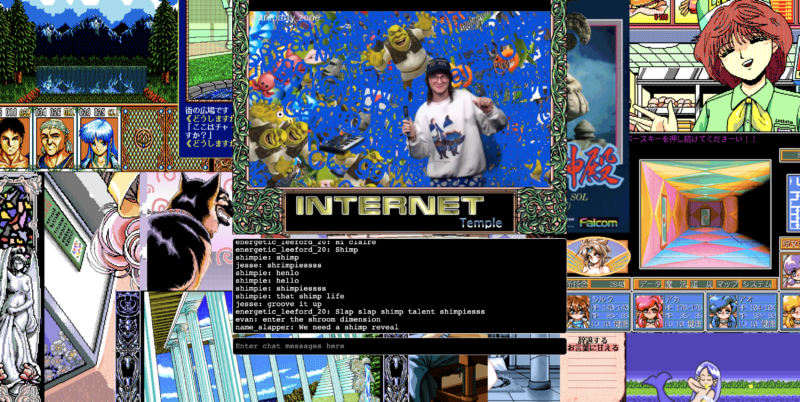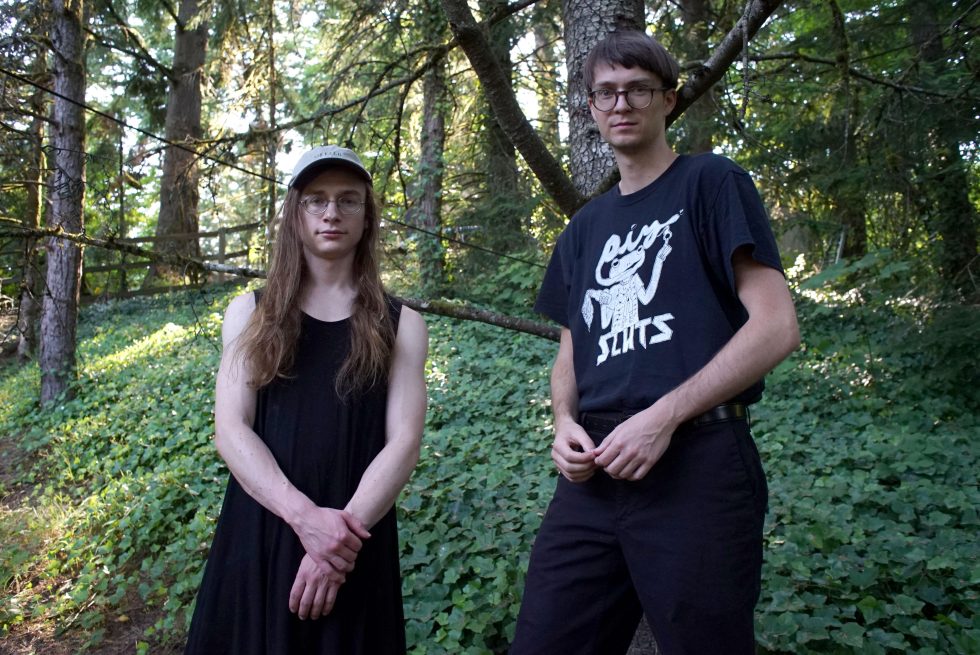
In early May, I needed a change of pace from my usual YouTube rabbit holes, having gone down a few of those during months of quarantine. My discovery of Internet Temple almost felt like finding a good bar or music venue; instead of being served content by a video platform’s algorithm, I had to know someone, get a tip, and type an entire URL.
The Temple made a blunt entrance on my browsing tab with little more than a cropped YouTube embed and a chat box with no scrolling feature. And then it got weird.
I witnessed a startling musical performance drenched in autotune (the laughs between songs were also autotuned). The singer wore snowman print boxers, an oversized sweater featuring abstract humanoid images, and a hat reading "WWW DOT COM MY ASS." He danced with three stuffed sheep in his hands, while behind him, a green screen was flooded with imagery chosen by audience members. They had selected images of Shrek and Unicode shrimp emojis.
All of this, I would come to learn, was not as silly as it appeared. Rather, Internet Temple's proprietors are invested in decimating the concept of Web 2.0, and they’ve started with three separate, intriguing projects.
Weird on the cheap
Performer Clayton Collins and venue creator Toby Alden (they/them) are a fringe breed, making idiosyncratic websites in the spirit of a bygone Internet. Collins, who sometimes goes by "Clayton Online," has a day job maintaining software that manages bus schedules. Alden is a full-time game developer working on an indie video game. The Portland duo's extracurricular creations are essentially alternatives to social media, and they're being made for next to no money.

The first of these, Internet Temple, features a crowded background collage of late-'90s Japanese game sprites. The Temple has hosted live music, DJ sets (some proudly streamed with abysmal quality through Google Hangouts), and poetry readings. The design, with one stage front-and-center, is antithetical to Twitch.
"If you're streaming on Twitch, you're competing with everyone else on there by design," Alden says. They point to the constant nudging by said website to jump to other streams or watch ads, fueled in part by an increasing dependence on the recommendation algorithm.
“They all make you feel bad”
Collins and Alden don't identify with a particular movement, but they're aware that other projects like theirs flourish in the Internet's corners, both by way of small cliques and lone-wolf programmers. Although DIY Internet culture has existed since the days of BBSes, its modern versions stand in contrast to major social media companies accused of selling data, avoiding taxes, and allowing misinformation—most recently by Congress in a July 29 hearing.
"You used to go online and type in the URLs of your favorite sites to see if hardcoregaming101.net had updated," Alden says. "Now it's mostly five or six sites: YouTube, Facebook, Twitter, Insta, Amazon, and so on."
"You don't even need to say, 'And so on,'" Collins interjects. "That's it. Those are them."
"And they all make you feel bad."
The Temple was written in Node.js over the course of three days in 2016. It's recently begun sidestepping YouTube Live (the kind of stream-and-chat system you might expect from a site like this) by borrowing code from Collins' platform Saladbowl, where he hosts and streams videos directly from his computer to bypass copyright strikes. This service is, according to Collins, a fight against the "corporate movement to make art private property." He uses it to broadcast his personal .MP4 video collection to friends, but the bigger goal is a DIY streaming tool for the masses.
reader comments
79